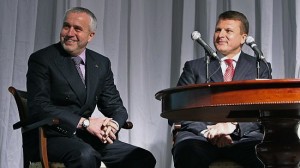
People's Party chairman and former Prime Minister Andris Šķēle (left) and Riga Deputy Mayor Ainars Šlesers answer questions at a joint press conference last week. It's unclear if their partnership will improve their parties' standing in the polls.
RIGA — While last week’s announcement that two of Latvia’s so-called oligarchs will establish a bloc for the October elections did not come as a surprise, it still shuffles the political playing field and offers some clue as to what the next government may look like.
The tandem of People’s Party chairman Andris Šķēle and Riga Deputy Mayor Ainars Šlesers has been months in the making, a creation dictated by the straightforward laws of political survival.
Just three days after the two men announced their merger, Latvijas Fakti released the April opinion poll on political parties, and the results were pretty for the aforementioned oligarchs.
The People’s Party, which ruled the roost during the so-called fat years, had a 1.9 approval rating, down from 2.7 percent in March, while Šlesers’ Latvia’s First/Latvia’s Way union mustered 3.3 percent, up from 2.6 percent last month.
In other words, together the two parties would have slightly over 5 percent, not a rosy prospect.
With characteristic hubris, Šlesers said that the combined bloc could grab as many as 37 seats in the 100-member Saeima. Few analysts believe this is possible. Aivars Ozoliņš, a columnist for the weekly magazine Ir, said the Šlesers-Šķēle merger would manage 10-12 seats “at best.”
Be that as it may, the new bloc won’t hold back any punches. Šķēle and Šlesers have proven to pull off some of the saaviest political campaigns in the past, and they have already created a quaint pun to market themselves – (AŠ)².
“This is the symbol of synergy of two leaders. One has more energy, and the other more experience and pragmatism,” says a brochure that the two politicians intend to distribute during the upcoming road-show across the region.
It is unclear whether this oligarchic marriage will attract more parties or organizations. Reports indicate that there is a strong chance that For a Good Latvia, a new movement founded by prominant businessmen that aims to garner a foothold in the next parliament, may join forces with Šķēle and Šlesers. However, given the two men’s abysmal rating, the businessmen may be reluctant to hinge their once-in-a-lifetime opportunity on political has-beens.
“It’s strange that not one of the businessmen on whose back (Šķēle and Šlesers) want to ride into Parliament, hasn’t asked himself the question about where were Šlesers and Šķēle when the crisis began?…And how can the system be fixed by those who skewed it?” Ozoliņš wrote.
A glance at future coalition-building is the most fascinating aspect about the new bloc. As many analysts agree, the newly formed Unity bloc, the Russian minority advocates Harmony Center and the Greens and Farmers Union are likely to be the top three winners. Assuming the pro-business bloc gains, say, 10, then Latvia is likely to see a government led by Harmony Center and supported by the Greens and Farmers (led by Latvia’s third so-called oligarch Ventspils Mayor Aivars Lembergs) and Šlesers-Šķēle.
In this light, as Ozoliņš argues, the recent vote on General Prosecutor Jānis Maizītis, who was expected to be a shoo-in but was rejected by lawmakers, was a test case for cooperation among these three parties.
Ostensibly, one of more of the oligarchs saw Maizītis as a threat and wanted out of the way, and he (or they) turned to the others looking for support. Given how Maizītis hunted the oligarchs in the past, it is not difficult to see them colluding to call for a closed ballot at the last minute and then dumping the prosecutor’s re-appointment to the post.












